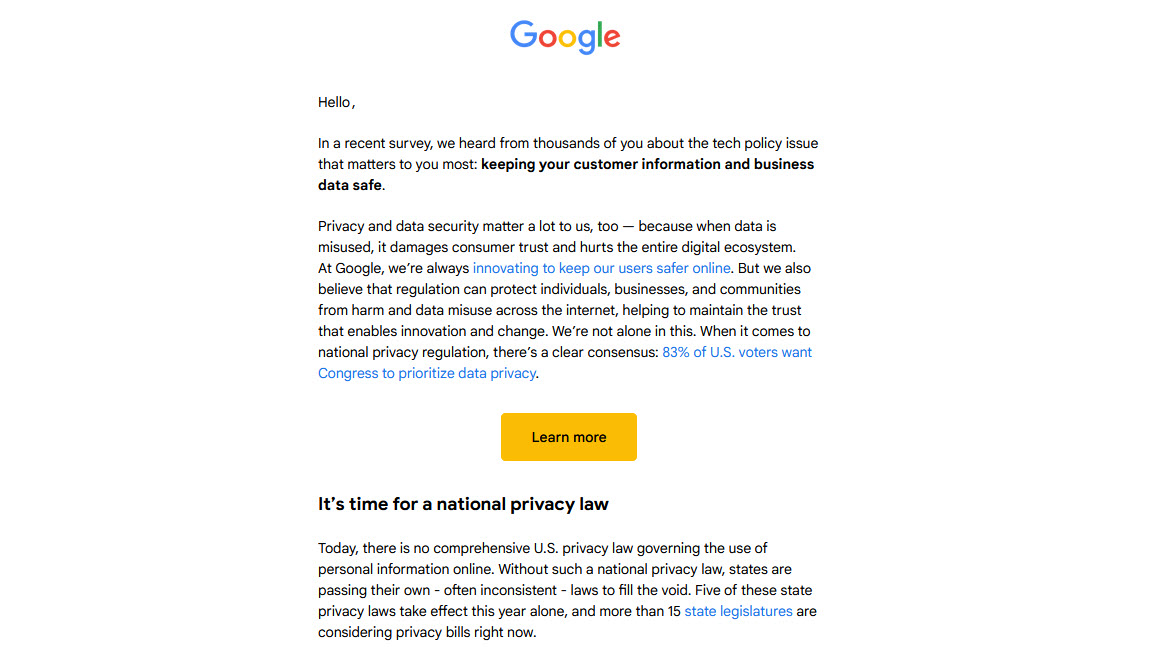
Your Personal Data is a Commodity
Google has has been in the spotlight in recent years for its lack of respect for user privacy, especially in the European Union and states like California. The company collects and stores vast amounts of personal data from its users. Google then uses those data to target ads and customize its services to individual users. Google's data collection practices are often criticized as a violation of user privacy, as it is often unclear what data is being collected, how it is being used, and who can access the data. Furthermore, Google has been accused of not providing users with enough control over their own data.
Privacy Policies Aren't an Easy Read
Google has also been criticized for its opaque privacy policies. Its policies are often long and difficult to understand, which makes it hard for users to determine how their data is being used and by whom. This can leave users feeling vulnerable and exposed, as they do not know how their data is being handled or who has access to it. As a result, Google has been subject to multiple privacy lawsuits and complaints over the years. Google also has a history of sharing user data with third-party companies, including advertisers. This can lead to the data being used in ways that the user never intended it to be used, leading to further issues with privacy and security.
Ad Revenue Drives Privacy Policy Decisions
Google's lack of respect for user privacy is a significant concern, as it can have a significant impact on user trust and lead to serious privacy violations. It is important that Google and other tech companies take user privacy seriously and develop policies and procedures to ensure that user data is secure and used only for its intended purpose.
Google Analytics Alternatives
Google Analytics has long been the go-to for businesses and website owners who are looking for insights into their website traffic. However, there are plenty of alternatives out there that can provide similar data insights, as well as additional features that may be better suited for certain businesses' needs. This article will discuss some of the Google Analytics alternatives that are available on the market.
One of the most popular alternatives to Google Analytics is Adobe Analytics. Adobe Analytics is tailored towards enterprise-level businesses, as it allows for deep segmentation of customer data and granular tracking of customer journeys. It also supports integrations with other Adobe products, such as Adobe Target and Adobe Audience Manager, which helps to create better customer experiences.
Another potential alternative is Clicky, which is a lightweight analytics platform that is easy to set up and use. It offers features such as real-time analytics, visitor segmentation, and a customizable dashboard. It also offers multiple levels of access to prevent data misuse.
Mixpanel is another great option for those looking for an alternative to Google Analytics. It provides customer journey analytics, heatmaps, and user segmentation, as well as advanced reporting capabilities and integrations.
Finally, Matomo (formerly known as Piwik) is an open source analytics platform that allows full ownership and control of collected data. It allows users to customize their own dashboards and reports, as well as track visitor engagement with heatmaps and user segmentation. Matomo is a privacy-focused web analytics platform that is used for statistical analysis. Information collected is not used to build audience segments for marketing purposes. Matomo can be configured to be cookieless and to comply with even the strictest privacy laws, respecting user confidentiality.
Vaultalytics is Going Against the Grain
Vaultalytics has sought out alternatives to Big Tech, favoring Matomo over Google and Adobe's analytics platforms. Vaultalytics is also a Protonmail partner, offering a secure, encrypted email service. Our goal is to build a subversive tech stack that lauds privacy and innovation.